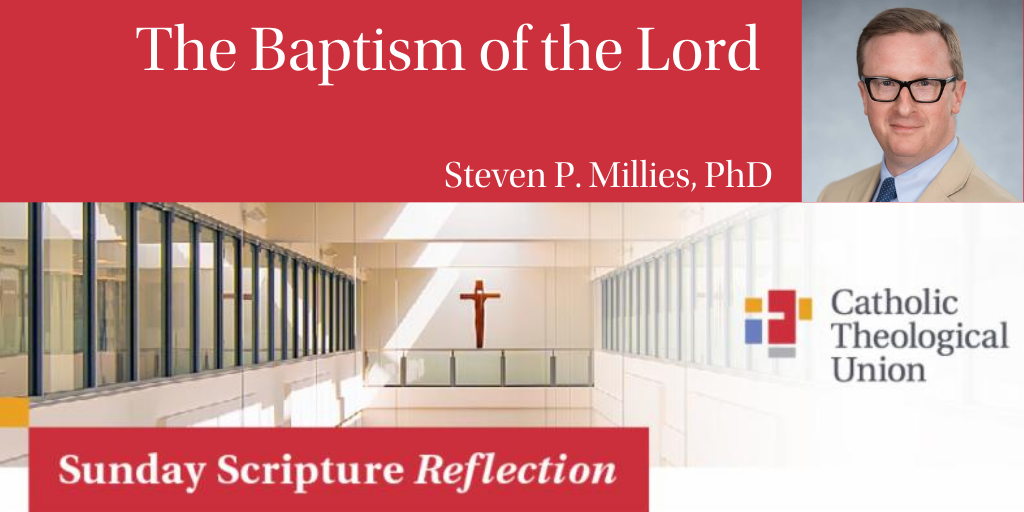

Readings:
Reading 1: Is 42:1-4, 6-7
Responsorial Psalm: Ps 29: 1-2, 3-4, 3, 9-10
Reading 2: Acts 10:34-38
Gospel: Lk 3:15-16, 21-22
A controversy erupted last month when the Diocese of Marquette announced that “A person who publicly identifies as a different gender than his or her biological sex or has attempted ‘gender transitioning’ may not be Baptized, Confirmed, or received into full communion in the Church, unless the person has repented.” The controversy recalls a pastoral problem that Pope Francis encountered as archbishop of Buenos Aires, and which he has discussed since his election as pope. Francis described a priest in Buenos Aires whom he corrected when the priest refused baptism to the child of an unwed mother, and how he told the priest with unusually strong language that he was “hijacking” the sacrament and driving “God’s people away from salvation.” Pope Francis has gone on to include the children of unmarried parents in the baptisms he has performed as bishop of Rome. The circumstances in Marquette and in Buenos Aires were very different. The underlying question is the same: Whom is to be baptized?
The question takes on particular meaning as we observe the Feast of the Baptism of the Lord. The baptism of Jesus by John, which took place in a Jewish context, both sets the pattern for our own baptism and still is very little like the baptism we know. The word baptism comes to us from the Greek βάπτισμα meaning, literally, “to dip in water.” Water from the earliest pages of Scripture is a symbol of life. Ancient people long ago had intuited what science today tells us, how intimately we are connected biologically to water. In the practice of Judaism, to immerse in water is to embrace the God of life. Among Christians, baptism is the rite of initiation to the community of believers. For both Christians and Jews, these ritual acts mark significant moments. They mark times when we turn toward God and affirm our relationship to the God of life. These rituals mark new beginnings.
We Christians now are at the end of a season of beginnings. The first Sunday of Advent began our new liturgical year. Christmas celebrated the Incarnation, the beginning of Jesus’s life on earth. Epiphany marked the beginning of the sharing of God’s new covenant with all the peoples of the world. As we zoom forward from Epiphany to the Baptism of the Lord, we witness the beginning of Jesus’s public ministry. These beginnings come as a reminder in our troubled time that the God of life asks for us to be open to life in all its dimensions and in all the ways we find one another. To embrace the God of life is to embrace all that God loves. It calls us toward discomfort, to love even when we find it difficult.
Our readings from Isaiah and Acts are rich with reminders of how widely God wants God’s love to be shared. “I formed you and set you as a covenant of the people, a light for the nations,” we hear in Isaiah. Acts finds Peter preaching in the house of Cornelius that, “God shows no partiality. Rather, in every nation whoever fears him and acts uprightly is acceptable to him.” God loves all of God’s people despite all of the ways that we fail, a fact encoded into our liturgical life by the way we mark these beginnings every year. Like the turning of the liturgical seasons with each page of the calendar, our Christian life also is a process always of beginning again because we have stumbled. And, each time God waits for us again to begin with a reminder of how much God loves us. Always there comes another Christmas, always there is God-with-us. Always there is the reminder of the free gift we are given each time we begin again, “my beloved Son” with whom God is “well pleased.” God’s love is a gift for everyone as much as all of our constant beginning-again reminds us that not one of us can deserve the gift more than anyone else.
Whom is to be baptized? Our Catechism and the Code of Canon Law tell us that, “Every person not yet baptized and only such a person is able to be baptized.” The church baptizes freely, exactly as Pope Francis has insisted for just the reason that Pope Francis named: the church must not erect a barrier before grace that God has not placed there.
As we now move from this season of beginnings back into Ordinary Time, we can keep that scene of Jesus’s baptism with us as we embark on the year we now have fully begun. There on the shore of the Jordan we find Jesus, whom we Christians believe to be the way, the truth, and the life, with “all the people” whom John baptized. There Jesus and the people stand together in prayer, and God speaks to them the message of the gift of new life given to the world, to all peoples. The image is an icon of a church for all, one to which God calls all of us regardless of who we are.
We are a people God loves so totally as to spare nothing to be close to us.